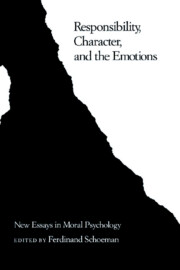Book contents
- Frontmatter
- Contents
- List of Contributors
- Acknowledgments
- 1 Introduction
- Part I Responsibility and Character
- 2 Identification and Wholeheartedness
- 3 Sanity and the Metaphysics of Responsibility
- 4 Unfreedom and Responsibility
- 5 Responsiveness and Moral Responsibility
- 6 Determinism and Freedom in Spinoza, Maimonides, and Aristotle: A Retrospective Study
- 7 Emotions, Responsibility, and Character
- Part II Responsibility and Culpability
- Index of Names
4 - Unfreedom and Responsibility
Published online by Cambridge University Press: 03 February 2010
- Frontmatter
- Contents
- List of Contributors
- Acknowledgments
- 1 Introduction
- Part I Responsibility and Character
- 2 Identification and Wholeheartedness
- 3 Sanity and the Metaphysics of Responsibility
- 4 Unfreedom and Responsibility
- 5 Responsiveness and Moral Responsibility
- 6 Determinism and Freedom in Spinoza, Maimonides, and Aristotle: A Retrospective Study
- 7 Emotions, Responsibility, and Character
- Part II Responsibility and Culpability
- Index of Names
Summary
In what follows, I want to examine a case of action out of rage, where the agent seems to be unfree and yet responsible – at least on widespread views of responsibility, stressing the relation between an act and the agent's “character” (in some sense). Often these views, or variants of them, are reflected in compatibilists' suggestions for understanding freedom – or at any rate, that sort of freedom that entails responsibility. They also have been represented as yielding an alternative account of other apparent cases of responsibility without freedom – where freedom is assumed, as it is (especially) by incompatibilists, to involve the ability to do otherwise. However, I shall argue that the proposals fail to capture our intuitions on my own case, except as applied to a limited notion of responsibility – one on which it does not entail freedom. I shall give freedom a somewhat different interpretation, along lines I have indicated elsewhere. The essential condition of freedom, on this view, is that it be reasonable to expect the agent to do otherwise; but it also implies that alternative action is not too much to require of the agent, under the circumstances. It therefore has some normative content – and I shall go on to argue that it seems to be quite pervasively normative when spelled out further in application to my case – but “control” (or some related property) may be thought of as representing the factual core of this rough notion of freedom.
- Type
- Chapter
- Information
- Responsibility, Character, and the EmotionsNew Essays in Moral Psychology, pp. 63 - 80Publisher: Cambridge University PressPrint publication year: 1988

